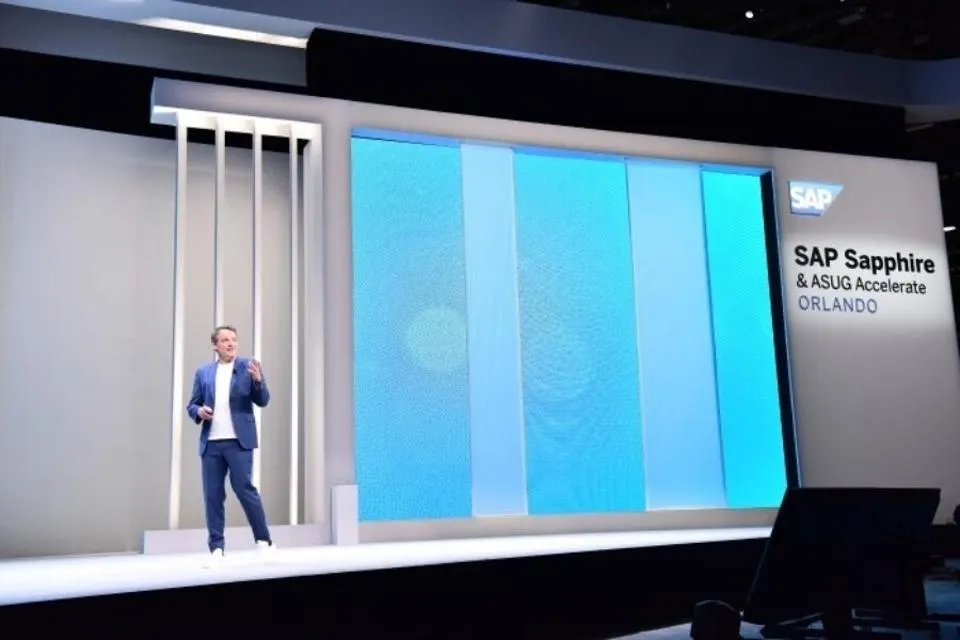SAP, the German enterprise software giant, made a resounding statement about its commitment to artificial intelligence (AI) at its recent Sapphire user conference held in Orlando from June 3rd to 5th. The event, attended by 12,000 customers and partners on-site, with another 15,000 tuning in remotely, served as a platform for SAP to unveil its AI strategy and showcase its AI-infused offerings.
As the world’s largest provider of enterprise applications, with 27,000 customers and a staggering 300 million users relying on its software, SAP’s embrace of AI is a pivotal move that could reshape the enterprise software landscape. The company’s message was clear: It has gone all-in on AI, embedding an AI copilot called Joule throughout its enterprise portfolio.
The integration of Joule represents a significant shift in how SAP envisions its users interacting with its software. Joule is designed as a role-based user interface that understands the processes workers are engaged in and provides assistance at critical points in the workflow where users frequently need extra help. This AI-powered assistant allows users to obtain additional information or suggested resolutions to problems with unprecedented ease.
Christian Klein, SAP’s CEO, emphasized the practical value proposition of Joule, stating, “We are not adding use cases unless they add value.” This statement underscores SAP’s commitment to ensuring that each AI-enabled feature or use case delivers tangible benefits to customers, rather than merely serving as a marketing gimmick or technology showcase.
The integration of AI into SAP’s offerings extends beyond Joule. The company has already developed 50 use cases where AI can help customers derive additional benefits from their solutions, with plans to increase this number to around 100 by the end of the year. SAP’s definition of AI encompasses both generative AI based on large language models and AI based on machine learning techniques.

One of the standout AI-powered offerings from SAP is the RISE with SAP solution, which includes an AI-powered cloud ERP system that is managed and optimized by SAP itself. This feature-rich private cloud offering is complemented by SAP’s GROW offering, which provides a similar AI-enabled public cloud solution tailored for small and mid-sized companies.
SAP’s approach to AI goes beyond narrow, siloed solutions. The company argues that its end-to-end view of business processes, facilitated by its Business Technology Platform, enables it to create AI use cases that span the gray spaces between applications, providing a holistic AI-driven experience.
However, SAP’s AI ambitions are not without challenges. One particularly thorny issue is the Customer Permission Issue. While many use cases have been developed using SAP’s internal training data, some use cases require customer data for training or performance improvement. However, some customers may be reluctant to share their data, fearing that it could benefit their competitors.
SAP highlighted several compelling AI use cases during the conference. For instance, AI can be leveraged for code generation to create extensions to the ERP system, providing managers with insights for compensation-related discussions, and enabling more accurate sales forecasting by predicting the optimal combinations of salespeople and products to drive sales.
Nevertheless, the supply chain use cases were among the most intriguing. Supply chain management has long been a core strength of SAP’s offerings, and the integration of AI promises to further enhance these capabilities.
One innovative use case involves using AI to improve the quality of master data, such as identifying potentially duplicate SKUs. AI can also help refine critical parameters like lead times, which are often set and then ignored, even though they can change over time. By leveraging machine learning, SAP aims to detect and fix these issues, enhancing the accuracy of supply chain planning.
Additionally, SAP is addressing the “black box” problem in supply chain planning, where users often struggle to understand the rationale behind recommended manufacturing or inventory plans generated by optimization runs. With Joule, users can simply ask, “Why are service levels declining?” and receive a concise, interpretable explanation in seconds, along with potential solutions derived from optimization runs focused on a confined set of scenarios.
Another innovative use case targets logistics, where SAP plans to combine generative AI and optical character recognition (OCR) to improve the accuracy of data extraction from shipping documents. Many carriers still rely on paper documents, which are manually keyed into logistics applications, introducing errors. By leveraging the complementary strengths of AI and OCR, SAP believes it can significantly enhance the reliability of this data extraction process.
While other enterprise software providers are also exploring AI integrations, SAP’s commitment to AI appears unparalleled. The company’s “all-in” approach, encompassing generative AI, machine learning, and AI-infused applications across its portfolio, positions it as a frontrunner in the race to deliver AI-powered enterprise solutions.

However, it’s worth noting that the success of SAP’s AI strategy will ultimately depend on the tangible value and reliability it can deliver to customers. While the use cases showcased at Sapphire are promising, real-world implementation and adoption will be the true test of SAP’s AI capabilities.
Additionally, as AI becomes more pervasive in enterprise software, ethical considerations around data privacy, algorithmic bias, and transparency will become increasingly crucial. SAP will need to navigate these challenges carefully to maintain customer trust and ensure responsible AI deployment.
Nonetheless, SAP’s bold embrace of AI represents a significant shift in the enterprise software landscape. By embedding AI throughout its portfolio and enabling AI-driven workflows and decision-making, SAP is positioning itself as a pioneer in the AI-powered enterprise era.
As the company continues to develop and refine its AI offerings, it will be fascinating to observe how SAP’s customers respond and whether this AI-centric approach can deliver the promised value and efficiency gains. Regardless of the outcome, SAP’s Sapphire conference has undoubtedly set the stage for a future where AI becomes an indispensable part of enterprise software, transforming how businesses operate and make decisions.
Copyright©dhaka.ai
tags: Artificial Intelligence, Ai, Dhaka Ai, Ai In Bangladesh, Ai In Dhaka, Google, Claude, Future of AI, SAP



